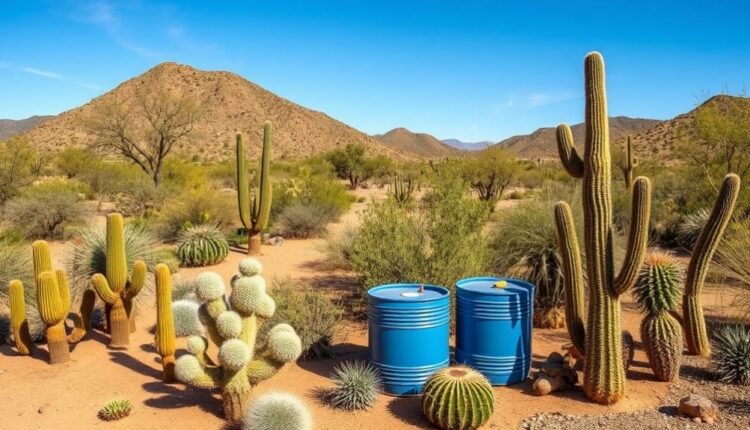Tucson Implements New Water Conservation Measures Amid Ongoing Drought Concerns
Tucson's new water conservation measures are a direct response to the severe drought impacting your community. There are stricter watering guidelines, allowing irrigation only on designated days to optimize usage. You can also take advantage of incentives for sustainable landscaping, like converting your yard to xeriscaping, which considerably reduces water consumption. The city emphasizes community engagement through workshops that teach effective conservation practices. These steps not only preserve essential water resources but could also lower your utility bills. Stay informed, and you'll uncover more about how Tucson is tackling this pressing issue together.
Current Drought Situation in Tucson
Tucson frequently faces severe drought conditions, a reality that demands urgent attention from residents and city officials alike. The drought impact is evident across the region, as dwindling water supplies threaten both the environment and daily life. With water scarcity becoming a pressing issue, you may notice changes in your local landscape—once lush parks now show signs of stress, and water restrictions are more common.
It's not just about the immediate environment; the economic implications are significant too. Agriculture, an essential part of Tucson's economy, suffers under these harsh conditions, leading to increased food prices and reduced crop yields. You might find it alarming that the Colorado River's dwindling levels directly affect Tucson's water supply, making it imperative for you to understand this connection.
Moreover, the health of local ecosystems hangs in the balance. Wildlife is struggling as habitats dry up, creating a ripple effect through the food chain. As a community, you have a role to play in conserving water and advocating for sustainable practices. Recognizing the severity of Tucson's drought situation is your first step towards fostering a culture that prioritizes water conservation for future generations.
Overview of New Measures
Implementing innovative water conservation measures is essential for addressing Tucson's ongoing drought crisis. One of the most effective strategies you can adopt is rainwater harvesting. By capturing and storing rainwater from your roof, you can greatly reduce your reliance on the municipal water supply. This practice not only conserves water but also lowers your utility bills, making it a win-win situation.
Another important measure is greywater reuse. You can repurpose water from sinks, showers, and washing machines for irrigation purposes, giving a second life to water that would otherwise go down the drain. Installing a greywater system can be relatively simple and is a proactive step toward sustainable living.
Both rainwater harvesting and greywater reuse are not just beneficial for your household; they contribute to the city's overall water conservation goals. By embracing these practices, you play a critical role in preserving Tucson's water resources. So, take action now—implementing these measures can make a considerable difference in combating the drought and ensuring a sustainable future for your community. Don't wait; start conserving today!
Stricter Watering Guidelines
As drought conditions continue to challenge our water supply, stricter watering guidelines have become essential for conserving Tucson's precious resources. You need to understand how these new regulations impact your water usage and the conservation techniques you can adopt to comply.
To help you navigate these guidelines, here's a quick reference table:
| Watering Day | Time Limit | Conservation Technique |
|---|---|---|
| Odd-numbered days | 5 AM – 8 AM | Use drip irrigation systems |
| Even-numbered days | 5 PM – 8 PM | Collect rainwater for landscaping |
| Sundays | No watering | Use mulch to retain soil moisture |
Incentives for Sustainable Landscaping
Transforming your yard into a sustainable landscape not only enhances your home's beauty but also plays an essential role in conserving water. By embracing xeriscaping benefits, you can greatly reduce your water usage while creating an eye-catching environment. Tucson offers various incentives that make it easier for homeowners like you to adopt this eco-friendly approach.
Utilizing native plants is a critical aspect of sustainable landscaping. These plants are adapted to the local climate, requiring less water and maintenance than non-native species. As you integrate native plants into your garden, you'll witness the vibrant colors and diverse wildlife they attract, all while enjoying the peace of mind that comes with lower water bills.
Tucson's incentive programs may include rebates for converting traditional lawns to xeriscaped areas, free consultations on sustainable landscaping, and educational resources to guide you through the process. By taking advantage of these incentives, you not only invest in your property but also contribute to the larger goal of water conservation in the community.
Community Engagement and Education
Engaging the community is crucial for maximizing the impact of water conservation efforts in Tucson. It's not just about implementing measures; it's about ensuring everyone is on board. One effective way to achieve this is through targeted water education initiatives. By informing residents about the importance of conserving water, you empower them to make informed choices that benefit both their households and the community at large.
Participating in community workshops can greatly enhance your understanding of practical conservation techniques. These workshops provide hands-on experiences, allowing you to learn about efficient watering methods, drought-resistant landscaping, and the significance of native plants. You'll discover how small changes can lead to substantial water savings, helping to preserve this critical resource.
Moreover, encouraging dialogue among community members can foster a culture of conservation. Share your success stories and learn from others' experiences. When you involve your neighbors and friends, you create a supportive network that amplifies the impact of these efforts. By prioritizing community engagement and education, you're not only contributing to Tucson's water conservation goals but also ensuring a sustainable future for generations to come.



Comments are closed.